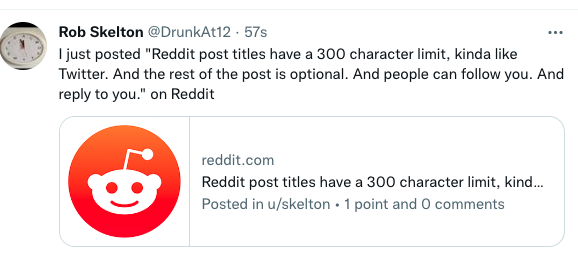What we consider to be “social networks” mostly aren’t.
Facebook is a true social network, where keeping up with and communicating with hundreds of actual friends and acquaintances is typical. You cannot leave FB for a rival social network, because your friends are not there – Catch 22.
Twitter is mostly for following what famous people and news sources say, and commenting. Or people of minor fame in a Ponzi scheme of acknowledgment and validation. You can DM people but it wouldn’t matter if that went away.
Instagram is similar to Twitter – easily replaced, with connections not being critical in the real world.
Musk has mused that Twitter could become like WeChat, a Swiss-army-knife social app (there are many reasons why that would fail). I suggest that it should go the other way, and have zero social applications.
The next Twitter, I think Pony Express is a good name…
Pony Express would be just a news aggregator. So, the same as Twitter is now, but:
- Greater variety of post types – images, links, long-form, PDF, press release, scores, polls, products with “buy now” buttons.
- Categories for posts that you decide, like folders in an email account
- No video.
- No DMs
- Sharing is all external, like “share to Facebook”
- No promoted posts
It will need to be a system that can expand to have whichever post types business want.
Pony Express will have verified and non-verified users. Only the verified can post or leave comments. Everyone else can still read posts and share externally.
Verification is free, via TripledChecked.com. Because of the verification, which truly knows who you are, people will be very wary of doing anything illegal on Pony Express, which means moderation costs will be significantly reduced. We could even reward users for moderating – easily done by ratios of reporting and others verifying that there is a problem.
There will also be different subscription types. Standard is similar to what Twitter has today, ads that are not tailored to you. But if you are willing to see ads for categories like gambling, crypto etc, then you can earn credits/points/crypto for that, regardless of your interactions with them, but do you need levels of general activity.
If you pay, then you get to:
- choose which categories of ads you see
- see far fewer ads
- prioritise the users that you follow, how they rank in your feed
Also different, is that the famous people / news sources that you follow, have their own profile page that is much better than what the other services offer. A page that can be your home page you send everyone to:
- Links to everything you have – other socials, online store, etc (Pony Express will not have any store function)
- Photos
- Archive of posts, sortable by category as well
- Badges (like a charity you have donated to, probably NFT-powered)
- Endorsements (essentially the other users that you like)
- Background art if you want, but it will be just wallpaper down the sides.
- Music playlist (via a 3rd party)
- Recommended books (affiliate with Amazon or the like)
- Bio
- Contact form for businesses
And so on. Not dissimilar to what the other networks have, but making it a true feature. Regular people can use it instead of having a website. Businesses can use a template that makes it is a good landing page for ads.
And here’s the killer – GET THE NEWS FIRST
For a fee (probably a freemium model), there is a companion app that is for creating the posts, and sending them to other platforms as well. Not unlike existing 3rd party tools that schedule posts. What makes it special is that your posts will appear on Pony Express first, and the others via a time delay. That delay might only be a few minutes, but everyone will know where they can get the news first.

